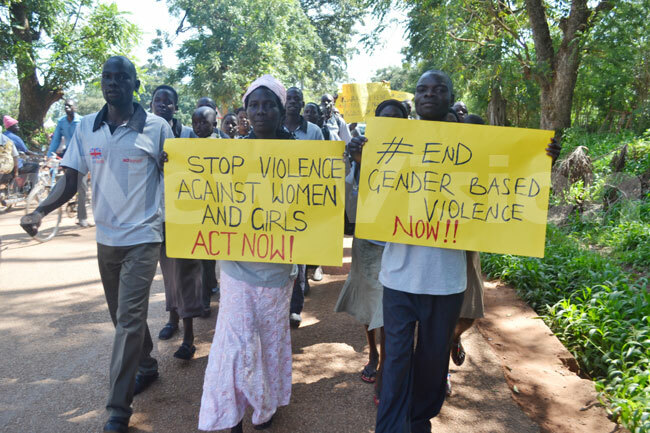'I used to enjoy beating my wife every day'
In Uganda, more than 1 in 5 women aged 15-49 years (22%) report that they have experienced sexual violence.
PIC: A man drags his wife for a beating while his peers cheer him on
DOMESTIC VIOLENCE
Allan Keralli Jwata grew up believing that beating a wife was normal. When the time came for him to marry in 2006, he practiced this belief dutifully.
"My neighbour would beat his wife regularly. It is just what men around did. If you beat your wife, she would behave well," Jwata says.
The 33-year-old resident of Junjwata village in Panyango sub-county, Pakwach district, turned his wife into a punching bag immediately after marriage.
"Beating my wife was fun. It was a daily ritual. I would beat her for denying me sex, which I always felt I was entitled to anytime I wanted it," Jwata says.
Jwata's wife, Evelyn Anirwoth, never gave up on her marriage. She stomached the beatings with no thought of leaving her tormentor. It was life.
His turning point was in 2011 when Action Aid International, under their project, Women Won't Wait, carried out community sensitisation on gender-based violence in their village.
"We were taught about the rights of women and girls. Since then, I have not lifted a finger against my wife," he says.
Jwata says there is now peace in their home and their economic status has improved.
"Because I no longer fight my wife, our economic status has improved due to inclusive decision making. I now have four cows and my children are in good schools in Gulu district," he boasts.
At the time of the interview, Jatwa's wife had traveled to Gulu, a distance of 100km from Panyango to pick their 10-year-old daughter .
Although some of his friends still believe in wife beating, Jatwa says he will continue to preach against violence against women and girls.
According to Men engage.org, violence against women is one of the world's most serious forms of discrimination and abuse of human rights. It takes place in every country in the world, across all sections of social and economic classes.
The Uganda Demographic Health Survey (UDHS) 2016 revealed a decline in prevalence of GBV countrywide. However, it is not yet Uhuru.
Sexual violence against women reduced from 39% in 2006 to 27.8% in 2011 and 22% in 2016.
In Uganda, more than 1 in 5 women aged 15-49 years (22%) report that they have experienced sexual violence at some point committed by an intimate partner compared to 8% of men.

Is male involvement the answer?
GBV is to a great extent perpetuated by males against females. It should be noted that men and boys, although to a lesser extent, are also vulnerable to violence.
According to Alain Sibenaler, the United Nations Population Fund (UNFPA) Representative, all forms of GBV are rooted in unequal power relations between men and women in society, where women are regarded to be of lower social status.
"Men have power in society and have multiple roles to play as husbands, fathers, friends, decision makers, service providers, witnesses, survivors, in speaking out against violence against women and ensuring that priority attention is given to the issue," Sibenaler says.
He notes that men can provide positive role models for young men and boys, based on healthy models of masculinity.
"Uganda has diverse cultures, customs and taboos that define men's status and expectations differently. Some of the cultural expectations promote violence against women and thus the need to specifically engage men to shun negative cultural practices," Sibenaler says.
The permanent secretary Ministry of Gender, Labour and Social Development Pius Bigirimana, says the ministry has put in place various legal frameworks to eliminate GBV.
Bigirimana mentions the Elimination of Gender Based Violence Act 2016, Domestic Violence Act, Prohibition of Female Genital Mutilation, among others.
"We are engaged in raising public awareness for prevention of GBV. The annual 16 days of activism campaign is one such activity," Bigirimana says.
He condemns GBV perpetrators and encourages men to respect women for the development of the country.
"GBV is a barrier to the attainment of gender equality, which is essential for social economic development. It has diverse effects on the health of women and girls and it also compromises their education and productivity," he notes.
Every year, Uganda joins the rest of the world to mark 16 days of activism against GBV. The national theme for this year's campaign is "From Peace in the Home to Peace in the Nation: Male engagement for the safety of women and girls" derived from the global theme of the 16 Days Campaign; "Together We Can End GBV in Education".